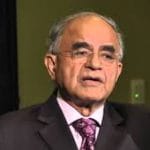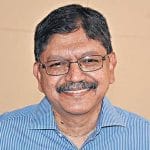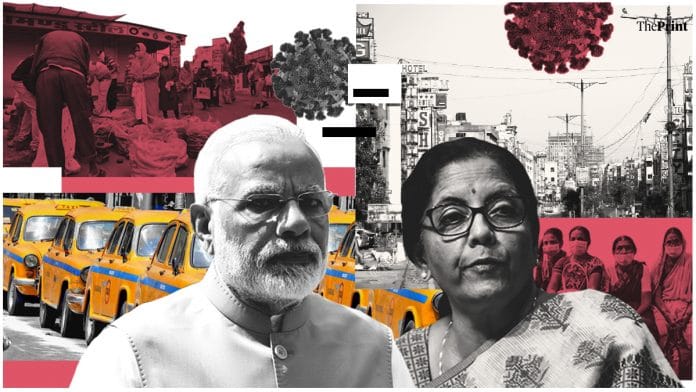As the Narendra Modi government considers the option of extending the Covid-19 lockdown beyond 14 April, concerns around its impact on the economy are growing. Even as the number of coronavirus infected cases rise daily, the 21-day lockdown has thrown the economy out of gear and unemployment touches a multi-decadal high. Vice President Venkaiah Naidu has said that “concerns of economy can wait for another day, but that of health can’t.”
ThePrint asks: Is talk of lifting lockdown premature or is it necessary to allow some economic activity?
Partial, selective lockdown should be the way forward to contain the spread of coronavirus
 Gurcharan Das
Gurcharan Das
Author and former CEO of Procter & Gamble, India
I would recommend a selective, partial lockdown.
India’s problem is the lack of robust data. Its biggest failure is not to have tested for coronavirus vigorously. Had it done so, it could have better identified high-risk clusters, locked down only those, and slowly unlocked the rest of the country. Our tiny Covid-19 numbers reflect this failure. Our death numbers are also low because India typically records only 20 per cent of its deaths.
Nevertheless, given the tragic devastation caused by the lockdown so far, we should take a cautious gamble and move towards a selective, partial lockdown. I would recommend that we continue with the full lockdown of 215 districts where cases have been reported. Of these, we should seal 62 districts, which account for 80 per cent of the cases, following the successful Bhilwara model. Bhilwara in Rajasthan was ‘India’s Italy’ until it succeeded in containing Covid cases.
In the remaining districts, I would suggest lifting of the lockdown on the condition that government ensures social-distancing and use of masks by people. In these districts, only select activities should be resumed. For example, harvesting of crop by local and outside workers, business activity that adheres to social distancing and public transport strictly for work. The ban on the elderly going out and the assembly of more than five people should continue nationally.
Can’t give privilege to economic costs over health costs in Covid-19 crisis
 Oommen C. Kurian
Oommen C. Kurian
Senior Fellow and Head of Health Initiative, ORF
We need to get the framing right: the discussion need not be on lifting the Covid-19 lockdown, but should be on the modalities of extending it in specific geographies. It is clear that India’s preparations as well as inventory, in contrast to the vast needs that we will face in the coming days, from what the examples of other countries indicate, look extremely modest.
This means slowing down the coronavirus is our best chance. Latest numbers suggest that lockdown has done what it was supposed to do, which was to prevent an unmanageable surge across the country. But there are hotspots, where the spread needs to be contained so that the risk of hospital-capacity getting overwhelmed is minimal.
Lockdown is the time when we should identify all the pockets where the virus is circulating, and proceed accordingly. Unfortunately, not many states have stepped up testing as yet like West Bengal, UP, Bihar, Gujarat. There are many states where tests per million population is in lower two digits. I hope the availability of rapid kits changes the situation.
States should also explore ideas like pooled testing so that we identify hotspots during the lockdown across the country, and make an informed decision about which areas can see a cautious easing of restrictions. Stakes are very high and we cannot give privilege to economic costs over health costs in making any decision. We need to know the scale of the spread before we decide where we extend the lockdown and where we lift it.
Monitor traffic, do randomised testing but lift Covid-19 lockdown in unaffected districts
 Narendar Pani
Narendar Pani
Professor, National Institute of Advanced Studies
The debate on the continuation of the lockdown has unfortunately taken an all-or-nothing approach. This may have been unavoidable in the initial phase when we did not know the spread of the coronavirus. But now that the government is reasonably certain that there are hundreds of districts that do not have a single Covid-19 case, there is really no reason to lock them down. If the traffic in and out of these districts is closely monitored, and randomised testing is done, then it is time to unleash whatever independent economic potential these districts have.
Even in the other districts, an interminable lockdown would become increasingly difficult to enforce. As supplies within these districts diminish, as is already happening, the resistance to the lockdown will grow. A sustained lockdown will also hurt the ability of more workers to survive without wages. A nuanced approach is needed for districts with Covid-19 cases. Supply chains would have to be revived, while limiting human exposure to the virus. This could be enabled by, for instance, the use of large container vehicles servicing multiple suppliers. It may also be necessary to identify economic activities that allow for substantial social distancing. We need to carve out, and focus our attention on the specific areas that need to avoid all contact, rather than using the sledgehammer of a nationwide lockdown.
Return to activity needs to be circumscribed or Covid-19 numbers will increase
 Dr Soham D. Bhaduri
Dr Soham D. Bhaduri
Editor, The Indian Practitioner & health-care commentator
We would have done better to extend the current Covid-19 lockdown while dynamically responding to emerging trends. We are talking of a graded exit and of focussing on emerging hotspots, which is probably the practical option, but the chances that Covid-19 will be showing sufficient hotspot confinement as a result of the 21-day lockdown are slim. We need to take stock of the contribution these 21 days make in bolstering our healthcare capacity for any upcoming shocks.
We are still in limbo over the strategies to be employed afterwards with less than a week for the lockdown to end. As has been suggested elsewhere, there can be a graded return to activity while protecting vulnerable groups like the elderly, but that would require dedicated observance, which is unlikely, and cases will soon start shooting up. It remains for the policy-makers to carefully weigh the economic consequences of a lockdown extension vis-a-vis the foreseeable damages due to Covid-19. And if possible, the lockdown should be extended. In any case, any return of activity has to be greatly circumscribed, unless you want the Covid-19 numbers to overwhelm quickly.
Also read: Modi govt’s Gareeb Kalyan: Does India have the ability to deliver amid Covid-19 lockdown?
By Pia Krishnankutty, journalist at ThePrint







Glad so many people are able to judge what’s right and what’s not right. Press is no more the reliable source of information. People have started to see where certain sections of media like print are trying to pull a false narrative against the PM. We are such a large population.. hats off to Modi for showing true leadership.
Praying to kolgaonwala Baba blessing and grace always Team India mission for peace and love one India one world 125 crs plus wish whatever be the scenario we are on verge of very good recovery for future. As precaution to keep calm and stay safe post locked down will be a game changer in all fields of India. With labour woes and banking situation to major and minor business will achieve customer satisfaction to humanity rises. We have done our bit as every one fall in line for example to follow as UN guidance. Keep counting with testing with challenge to center and state to assurance of food and money etc etc As hope
1. Partial, selective lockdown should be the way forward to contain the spread of coronavirus
Gurcharan Das.
2. Can’t give privilege to economic costs over health costs in Covid-19 crisis
Oommen C. Kurian
3. Monitor traffic, do randomised testing but lift Covid-19 lockdown in unaffected districts
Narendar Pani
4. Return to activity needs to be circumscribed or Covid-19 numbers will increase
Dr Soham D. Bhaduri
Mr. Modi needs to call so just support his call.
Unemployment has spiked close to 25 percent. Many self-employed people, who technically cannot be unemployed unless they close their business, have zero revenue for the last three weeks. ILO estimates 40% of Indians are in danger of slipping to poverty. The stock market has tanked 25 percent this year. Food consumption and supply have both reduced drastically. All this indicates one solution, lock-down needs to be lifted immediately. If any one supports continuation of lock-down, they should pay all people unemployed by lock-down 80-100 percent of their pre lock-down wages/salary/earnings. Billions cannot be forced to live a life of dogs for the fears of millions.
The only option left is an extended lockdown for another 4 weeks and a graded exit, phase by phase in a controlled , measured manner. THE PRINT is purely trying to subscribe the idea to end the lockdown by facilitating the views of those who endorse it and thus leading to a situation in Italy, Spain and US. THE PRINT being an online portal that survives purely on HINDU hatred and BJP hatred need to have a bit of shame while coming up with such misleading article. Once the numbers spike and things go out of control the same Leftist Liberal and Commie portal will blame the government as what we witness in US now. So, dear viewers please dont fall into this trap…
Excellent observation!
Doctors and health professionals said remain locked down. Businessmen and economists said open cautiously. We are no wiser, as these people are not wise but know only what they have been taught.
Blah, blah, blah, blah…the comment goes round and round like a rotten round apple.
Sounds like something one of the products of the Wuhan wet market would say. Aap kuchh din rock ke neeche chhipe hue thay, toh achha thaa.
A perfect Catch 22 situation. There are no good, or even half decent, options left. The BMC has acknowledged that Mumbai is now at community spread stage. Were more tests to be done all over the country, a grim picture would emerge. UP has sealed fifteen districts which include its most important towns. If we were to wait for the benign situation – no deaths, very few new cases – which has allowed Wuhan to reopen, that day may not come all summer. 2. The government is the best judge of not only the medical situation all over the country but also of the state of the economy and public finances. Harvesting the Rabi crop, next sowing the Kharif crop, these are activities that cannot be stopped. India is not Kashmir where ripened apples can fall to the ground, unplucked. Next manufacturing. Freer movement of goods traffic. We do not have the financial capacity to sustain a national lockdown much longer. Think of a swimmer whose lungs will burst if he does not surface.